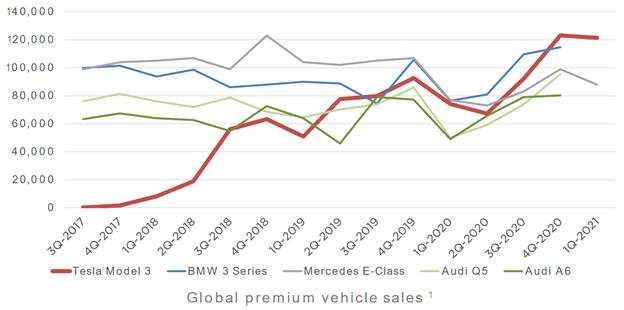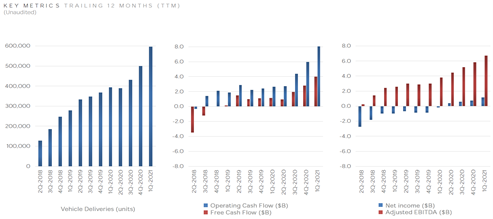
Tesla earnings; The bull and bear cases; Surely We Can Do Better Than Elon Musk; Liftoff: Elon Musk and the Desperate Early Days That Launched SpaceX
1) Tesla (TSLA) reported earnings after the close yesterday, and as usual, bulls and bears had plenty to feast on...
On the plus side, revenue was up a robust 74% year over year, driven primarily by sales of the Model 3. The car has soared to become the best-selling premium sedan in the world, as this chart from Tesla's investor slide deck shows:
Tesla also reported its seventh consecutive quarter of positive net income and fourth consecutive quarter of positive free cash flow (operating cash flow less capital expenditures). Lastly, the company has delivered (or is delivering) four factories around the world on time in Nevada, Shanghai, Texas, and Germany.
So what's the knock on Tesla? As one friend notes:
GAAP net income: $438 million
Subtract Bitcoin trading: $101 million
Subtract government subsidies (credits): $518 million
Total for Tesla's actual business: a loss of $181 millionHow a company with a core business that consistently loses money is valued at over $700 billion is beyond me!
My analyst Kevin DeCamp responds:
Stock-based compensation was $614 million, $299 million of which was CEO Elon Musk's compensation plan, accounting for almost a third of what's left.
Tesla didn't produce a single Model X or Model S during the quarter, which was a $200 million hit to cost of goods sold ("COGS").
So if you take your $181 million loss and add back Musk's comp and the S and X COGS hit, you get over $300 million in adjusted net income. This is very impressive given that this was Tesla's seasonably weakest quarter, plus there was a severe chip shortage that shut down some competitors' factories (Tesla apparently pivoted quickly to new microcontrollers, while simultaneously developing firmware for new chips made by new suppliers).
Also, Tesla's gross margin was 22% excluding credits, up sequentially and year over year, even with no S and X sales.
Regulatory credits were higher than expected yes, but I love it! These don't come from us taxpayers, but from other automakers who can't produce enough electric vehicles ("EVs"). So once again, Tesla is eating legacy automakers' lunch – and making them pay for it!
Lastly, all of the key metrics are trending the right way, and I anticipate that the company's cash flows will enable it to continue growing at roughly 50% annually for the foreseeable future:
My take is unchanged: TSLA is a bad short... and a bad long!
2) Though I have no position in the stock – either personally or in any of Empire Financial Research's newsletters – I continue to follow the company and CEO Elon Musk closely because I think they're both utterly fascinating.
I even have a special Tesla-focused e-mail list, which now has more than 3,000 readers, and which you can sign up for by sending a blank e-mail to: tsla-subscribe@mailer.kasecapital.com. Here's what I sent to that list yesterday...
I recently read this long, mostly critical article by Nathan Robinson in Current Affairs: Surely We Can Do Better Than Elon Musk. Excerpt:
There are two facts that I have sometimes found it difficult to reconcile. The first is that Tesla makes innovative and genuinely impressive electric vehicles that can hold their own against the fastest performance cars in the world. The second is that the CEO of Tesla, celebrated entrepreneurial genius Elon Musk, is a liar, huckster, and moron, who regularly says things so ignorant that I cannot understand how they can come from a human adult, let alone one treated by his fans as a super-genius.
Is one of these facts untrue? Are Tesla's cars actually bad, their deficiencies carefully covered up and their quality over-hyped? Is Elon Musk actually not a liar, huckster, or moron? If you look more closely, are things that look like fraud and stupidity to me actually signs of brilliance? Or is there a way for both facts to be true?
It turns out it's all true. The cars are impressive and their flaws get covered up. Musk is a lying ignorant grifter and he has inspired innovation in the electric car industry. Understanding that these seemingly contradictory things can be true simultaneously is important, because societies who cannot hold these two ideas at the same time may end up following scam artists and false prophets off the cliff and into the abyss.
I also just finished listening to the new book by Eric Berger, Liftoff: Elon Musk and the Desperate Early Days That Launched SpaceX, which I really enjoyed. Here's the summary:
The dramatic inside story of the historic flights that launched SpaceX – and Elon Musk – from a shaky startup into the world's leading-edge rocket company
SpaceX has enjoyed a miraculous decade. Less than 20 years after its founding, it boasts the largest constellation of commercial satellites in orbit, has pioneered reusable rockets, and in 2020 became the first private company to launch human beings into orbit. Half a century after the space race it is private companies, led by SpaceX, standing alongside NASA pushing forward into the cosmos, and laying the foundation for our exploration of other worlds.
But before it became one of the most powerful players in the aerospace industry, SpaceX was a fledgling startup, scrambling to develop a single workable rocket before the money ran dry. The engineering challenge was immense; numerous other private companies had failed similar attempts. And even if SpaceX succeeded, they would then have to compete for government contracts with titans such as Lockheed Martin (LMT) and Boeing (BA), who had tens of thousands of employees and tens of billions of dollars in annual revenue. SpaceX had fewer than 200 employees and the relative pittance of $100 million in the bank.
In Liftoff, Eric Berger, senior space editor at Ars Technica, takes readers inside the wild early days that made SpaceX. Focusing on the company's first four launches of the Falcon 1 rocket, he charts the bumpy journey from scrappy underdog to aerospace pioneer. We travel from company headquarters in El Segundo, to the isolated Texas ranchland where they performed engine tests, to Kwajalein, the tiny atoll in the Pacific where SpaceX launched the Falcon 1. Berger has reported on SpaceX for more than a decade, enjoying unparalleled journalistic access to the company's inner workings.
Liftoff is the culmination of these efforts, drawing upon exclusive interviews with dozens of former and current engineers, designers, mechanics, and executives, including Elon Musk. The enigmatic Musk, who founded the company with the dream of one day settling Mars, is the fuel that propels the book, with his daring vision for the future of space.
Filled with never-before-told stories of SpaceX's turbulent beginning, Liftoff is a saga of cosmic proportions.
There's quite a jarring contrast between these two accounts!
As usual, I'm somewhere in the middle...
Anyone (like Robinson) who calls Musk ignorant, a moron, and a grifter is a moron. Whether you love or hate him, he is indisputably a genius. He has an extraordinary entrepreneurial track record rivaling that of Steve Jobs and has built leading businesses in vastly different industries – PayPal (PYPL), Tesla, and SpaceX. In addition, years ago I spoke with two of the top auto/EV engineers in the world who worked at Tesla, and both raved about him. One said, "There is nothing that Elon Musk and JB Straubel can't do."
As for being a grifter, defined as "a person who engages in petty or small-scale swindling": a) there is nothing small-scale about anything Musk does... and b) he hasn't swindled his investors – he's made them fabulously wealthy!
That said, Musk's fanboys who worship him and blindly believe everything he says are also morons. He is a deeply flawed human being in so many ways. For starters, he utterly lacks an empathy gene. I can find no evidence that he has an ounce of kindness in him, and he has a vicious side, attacking and bullying his critics.
He's also a pathological liar. Lots of tech founders like Jobs are prone to exaggeration and setting unrealistic timelines, but Musk takes it to an extreme degree. For example, in October 2016, Musk said:
Basic news is that all cars exiting the factory have hardware necessary for Level 5 Autonomy so that's in terms of cameras, compute power, it's in every car we make on the order 2,000 cars a week are shipping now with Level 5 literally meaning hardware capable of full self-driving for driver-less capability.
Then, during Tesla "Autonomy Day" on April 22, 2019, Musk promised that the company's Full Self-Driving ("FSD") would be "feature complete" by the end of the year. This would lead to 1 million robotaxis on the road a year later (i.e., a year ago), which would result in a new Tesla purchased at that time for $50,000 (two years ago) soaring in value to $150,000 to $200,000 as a used car.
These statements are so absurd that I consider them securities fraud. But Musk doesn't care – he regularly crosses ethical and legal lines, daring anyone to do anything about it (pretty much nobody has – so far anyway).
Lastly, while he has many brilliant ideas, he has an equal number of truly idiotic ones, as Robinson documents. For instance, Musk has long dreamed of sending a human to Mars (I wouldn't bet against his ability to someday do this) and ultimately colonizing the planet with 1 million people. This is sheer lunacy, for reasons this article outlines:
It's 34.8 million miles away at its closest, and 250 million miles away at its farthest. It would take seven months to travel there, at least.
Then, on arrival, you'd find very little oxygen in Mars's atmosphere – it's mostly carbon dioxide.
The atmosphere is high in radiation, too. It's also so low in pressure your blood would literally boil as a result.
Mars has 38% of the gravity Earth does – and the lack of gravity could lead to serious health risks. Water is scarce and the soil is pretty toxic, too.
And if all of the above wasn't a barrier to life on Mars, we'd probably freeze to death first. NASA puts the average temperature of the red planet at around negative 81°F, which makes Earth's 57° sound quite pleasant. Temps can go up to 68° or drop as low as negative 195°.
"But why not pursue this bold vision?" you might ask. Because it's a terrible misallocation of time, attention, engineering talent, and trillions of dollars to pursue something that is impossible – and, even if it were, as Charlie Munger says, "Something not worth doing is not worth doing well."
All this said, I admire the boldness of Musk's ambitions and hope he's successful in converting the world to EVs, advancing autonomous driving, and continuing to make breakthroughs in rocketry.
Best regards,
Whitney


